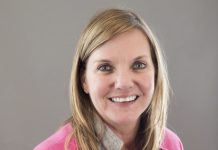Jessica Alderson is the CEO of So Syncd, “the dating app that matches compatible personality types.” She co-founded the app with her sister Louella.
Likewise, Jessica Alderson is also the “UK lead for Women in Tech.” Before So Syncd, she “worked as an equity research analyst for five years at Morgan Stanley.”
According to Jessica Alderson, So Syncd came out of a “break up with a long-term partner.” She “started using Myers-Briggs personality types as a framework to understand what went wrong.”
The break-up also happened when Jessica Alderson left her investment bank job. She decided to “take a year out to travel and learn about personality type compatibility.”
At this time, Jessica Alderson found that “some personality type combinations worked better in relationships than others.”
After a year of travel, Jessica Alderson talked with her sister, who told her about her friends and colleagues who “were going on these terrible dates with people they’d met on dating apps.”
Jessica Alderson convinced her sister that the personality-matching concept was accurate when they “applied the matching concept to our friends and her own successful relationship.”
After they talked, Jessica Alderson went to her sister’s apartment and “we started building So Syncd, our dating app that matches compatible personality types.”
Check out more interviews with dating app founders here. You can also watch Jessica Alderson in conversation here:
It was clear that some personality type combinations worked better in relationships than others. Jessica Alderson, So Syncd
Jerome Knyszewski: Thank you so much for doing this with us! Before we dig in, our readers would like to get to know you a bit more. Can you tell us a bit about your “backstory”? What led you to this particular career path?
Jessica Alderson: The idea for So Syncd was sparked by a break-up up with a long-term partner.
I started using Myers-Briggs personality types as a framework to understand what went wrong.
The break-up coincided with me leaving my job at an investment bank and I decided to take a year out to travel and learn about personality type compatibility.
It was clear that some personality type combinations worked better in relationships than others.
After my year of travelling, I was having drinks in Soho with my sister and she was telling me that her friends and colleagues were going on these terrible dates with people they’d met on dating apps.
I explained what I’d learned over the past year.
Louella, while being skeptical at first, became convinced of how accurate the personality-matching concept was when we applied the matching concept to our friends and her own successful relationship.
It turned out that she’d been in a long-term relationship with her perfect personality match.
The next morning, I went to my sister’s flat and we started building So Syncd, our dating app that matches compatible personality types.
Jerome Knyszewski: Can you share the most interesting story that happened to you since you began your career?
Jessica Alderson: Shortly after we launched So Syncd, we started a podcast called Personality Love Lab, where we interview couples to delve deeper into the dynamics of personality types and love.
One of the first interviews we did was with a couple who met on our app called Ben and Indy.
When they first connected on So Syncd, Ben was living in the UK and Indy was living in Paris.
They dated virtually at first due to Covid travel restrictions but eventually Ben was able to go and visit Indy in Paris.
We interviewed them on the first weekend they ever met. We kept in touch regularly and they would update us on how everything was going until one day, last November, Ben proposed.
I’ll never forget the moment I received that message.
I called my sister straight away. They are both such kind people, it was an incredible to think that we’d brought them together. They sent us photos on their wedding day.
Jerome Knyszewski: Can you share a story about the funniest mistake you made when you were first starting? Can you tell us what lesson you learned from that?
Jessica Alderson: I had a funny meeting with a VC firm that could have been a comedy sketch.
It was with two partners of the company and the idea that any man might care about anything other than looks when on a dating app was a completely novel concept to them.
They couldn’t believe that any men would sign up to a personality-based dating app.
I explained that we have an even split of men and women signed up to So Syncd but they just couldn’t believe that any man would take the time to do a personality test on a dating app.
It taught me that if someone just doesn’t get your idea, they might not be able to look past that, even if your numbers and traction are telling a different story.
Jerome Knyszewski: Do you have a favorite “Life Lesson Quote”? Do you have a story about how that was relevant in your life or your work?
Jessica Alderson: “If you risk nothing, then you risk everything.” — Geena Davis.
Risk is such an interesting concept and it’s obviously highly subjective but, for me personally, the biggest risk is feeling like I’m not living life to the fullest.
My new mantra is ‘keep calm and solve problems’. That’s my entire job in a nutshell. There are always new problems to solve; some big, some small.
You don’t want to be fighting fires all the time, but there are always things that could be improved or new ideas you could try.
My new mantra is ‘keep calm and solve problems’.
Jerome Knyszewski: Ok super. Here is the main question of our interview. Can you please share 5 things that can be done or should be done to help empower more women to become founders? If you can, please share an example or story for each.
Jessica Alderson: There are a number of actionable steps we can take to empower more women to become founders:
- Education around unconscious biases. Harvard Business Review has published two interesting articles around this topic.
This first study showed that 67% of the questions posed to male entrepreneurs were promotion-oriented, i.e. focused on how they will achieve their goals.
In contrast, 66% of those posed to female entrepreneurs were prevention-oriented, i.e. focused on safety, security, responsibility and vigilance.
The second study showed that investors are less likely to invest in founders who exhibit stereotypically feminine behavior.
In my first fundraising-meeting the investor said, “I really like your idea and I think you’ve done a great job but I don’t think you’ll be able to raise money.”I’m glad that we persevered and we’ve ended up with a group of investors who couldn’t be more supportive.
- Make diversity investment stats public. One of the most effective methods for improving access to capital to female founders would be for venture capital funds to make their diversity investment stats publicly available so that companies are held accountable.
Of course, we should use common sense and not assume that each fund will have a perfect split of diversity investments every year, particularly if they make very few investments, but this will help track longer-term trends.
- Reduce the reliance on warm introductions. Startups that are referred to VCs via warm introductions are 13 times more likely to be funded by them than startups which come to their attention via cold pitch deck submissions.
This puts founders without links to VCs (often diverse founders) at a significant disadvantage.
Investors are very busy and warm introductions are an easy way to filter through the hundreds of pitch decks they receive each week but they are by no means a fair way of filtering.
If investors rely on their existing network for warm introductions, they simply won’t see a diverse deal flow.
- Promote inspirational role models. Type ‘tech CEO’ into Google and have a look at the results; it takes a while to see any photos of women.
Showcasing more stories of inspirational female founders encourages women to view entrepreneurship as a realistic option, particularly if girls see these stories from a young age and grow up with them.
- Initiatives to encourage more female investors. As with a lot of significant changes, it starts at the top.
At the seed stage, female VC partners back almost twice as many gender diverse founding teams than male VC partners.
This trend continues for Series A rounds.
There are initiatives being take already, including the creation of networks that support female founders or women in certain industries, such as Women in Tech, who are rapidly growing their presence around the world. Gary Chimwa has just launched MentorshipHub, a mentorship platform for underrepresented founders.
You don’t want to be fighting fires all the time, but there are always things that could be improved or new ideas you could try. Jessica Alderson
Jerome Knyszewski: We are very blessed that some very prominent names in Business, VC funding, Sports, and Entertainment read this column. Is there a person in the world, or in the US with whom you would love to have a private breakfast or lunch with, and why? He or she might just see this if we tag them.
Jessica Alderson: Arianna Huffington. It’s admirable that she’s dedicated so much of her life to promoting truth and integrity, as well as showcasing the benefits of a healthy work-life balance.
Jerome Knyszewski: How can our readers further follow your work online?
Jessica Alderson: You can learn more about me and So Syncd here:
Jerome Knyszewski: Thank you for these fantastic insights. We greatly appreciate the time you spent on this.





